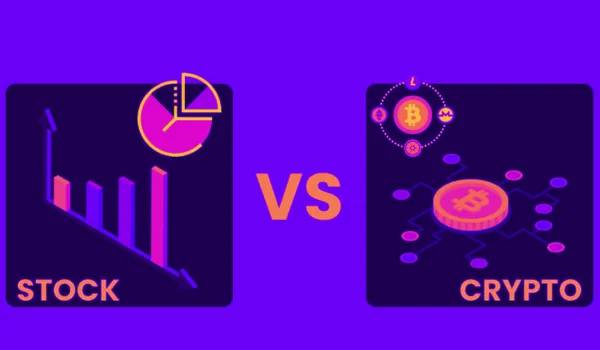The financial markets in India and globally have evolved rapidly in recent years. Investors today are spoilt for choice — whether to go the traditional route with stocks or take a modern approach with cryptocurrencies. But the real question remains: which is safer in 2025 — crypto or stocks?
To answer this, let’s dive into the risks, returns, regulations, volatility, liquidity, and investor behavior for both investment avenues.
🔍 Overview: Crypto and Stocks in India
- Cryptocurrencies like Bitcoin, Ethereum, Solana, etc., are decentralized digital assets. They’re traded 24/7 on crypto exchanges and are known for their high volatility and quick gains/losses.
- Stocks, on the other hand, are ownership shares in companies listed on regulated stock exchanges like NSE or BSE. Stocks have been a time-tested investment method for wealth creation, offering dividends and long-term returns.
⚖️ Regulatory Landscape: Who Watches What?

📉 Stocks
- Stocks in India are regulated by SEBI (Securities and Exchange Board of India).
- Investors are protected under various acts and mechanisms such as Investor Protection Fund, mandatory disclosures, quarterly reporting, and insider trading laws.
- Stock investing is transparent, and brokers are licensed and audited regularly.
🪙 Crypto
- Cryptocurrencies in India are not illegal, but they are not fully regulated either.
- As of 2025, the RBI and SEBI are working toward a regulatory framework, but there’s no comprehensive crypto law yet.
- A 30% flat tax on crypto gains and 1% TDS (Tax Deducted at Source) per transaction adds complexity and cost.
- Scams, rug pulls, and hacks remain a risk due to the lack of investor protection mechanisms.
✅ Verdict: Stocks are safer due to clear regulation, oversight, and protection mechanisms.
📊 Volatility and Risk
Stocks:
- Historically, stock markets have seen ups and downs but with relatively stable long-term returns.
- Large-cap companies like Reliance, TCS, Infosys, etc., are backed by strong fundamentals.
- Sudden crashes (like COVID-19 in 2020) happen, but are less frequent and often recover.
Crypto:
- Crypto is highly volatile. A single tweet or regulatory statement can shift prices drastically.
- Bitcoin, for example, has dropped over 50% multiple times before recovering.
- Tokens with small market caps are riskier and prone to manipulation.
✅ Verdict: Stocks are less volatile and hence safer for conservative investors.
💰 Returns: Short-Term vs Long-Term
| Investment Type | Historical Return (Average) | Volatility | Liquidity |
|---|---|---|---|
| Blue-chip Stocks | 10–14% per annum | Low | High |
| Mid & Small Cap | 15–25% (high risk) | Medium | High |
| Bitcoin | 80–100% in bull runs | Very High | Very High |
| Altcoins | 500%+ possible, but risky | Extreme | Medium to High |
Crypto has created many millionaires in a short time but has also wiped out portfolios overnight. Stocks, while slower, compound wealth reliably over 5–10+ years.
✅ Verdict: Crypto may offer higher short-term returns, but stocks are safer long-term wealth builders.
📱 Ease of Investment in India (2025)
- Stock investing apps like Zerodha, Groww, Upstox, and ICICI Direct are well-integrated with Indian banking, KYC norms, and offer seamless UPI investing.
- Crypto exchanges like CoinDCX, WazirX, CoinSwitch, and ZebPay now support INR transactions with UPI, and offer robust apps, but occasional banking friction may still arise due to RBI’s cautious stance.
✅ Verdict: Both are easy, but stock investing is more accepted and widely integrated with the Indian financial system.
🧠 Investor Psychology
- Stocks are considered “trustworthy” because of visible company data, brand value, and regulation.
- Crypto can be driven by FOMO (fear of missing out), speculation, and hype. New investors often enter during bull runs and exit with losses during crashes.
- Long-term stock investors build discipline, research skills, and patience — qualities vital for wealth creation.
✅ Verdict: Stocks promote healthier investing behavior and mindset.
🛡️ Security and Scam Risks
- Stocks are held in Demat accounts, insured and managed by NSDL/CDSL — extremely secure.
- Crypto wallets can be secure (hardware wallets), but exchange hacks, phishing, and scams still affect many.
✅ Verdict: Stocks are safer in terms of custodial security.
🔐 Tax Implications in India
Stocks:
- Short-term capital gains (STCG) = 15% tax
- Long-term capital gains (LTCG) = 10% on gains above ₹1 lakh
- Option to offset losses, and carry forward for 8 years
Crypto:
- Flat 30% tax, no deductions
- No loss carry-forward or set-off allowed
- 1% TDS on every trade, affecting liquidity and ROI
✅ Verdict: Stocks are more tax-efficient in India.
📌 Final Verdict: What Should You Choose in 2025?
| Category | Winner |
|---|---|
| Regulatory Safety | Stocks |
| Volatility | Stocks |
| Returns (Short-Term) | Crypto |
| Returns (Long-Term) | Stocks |
| Ease of Use | Tie |
| Security | Stocks |
| Tax Efficiency | Stocks |
📝 Conclusion
In 2025, stocks remain the safer and more stable investment choice for Indian investors — especially beginners or those with low risk tolerance. That said, crypto can still be part of a well-diversified portfolio if approached carefully with a small percentage (5–10%) and only after thorough research.
For the average investor looking to build consistent, long-term wealth, SIPs in mutual funds, index investing, and blue-chip stocks are your best bet. For those with higher risk appetite, exposure to top cryptocurrencies (like Bitcoin and Ethereum) may offer speculative gains — but never invest more than you’re willing to lose.

